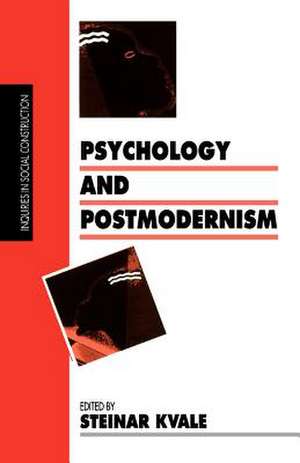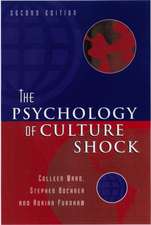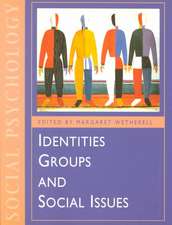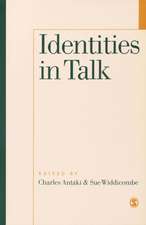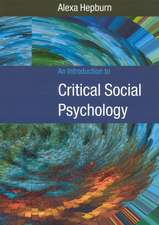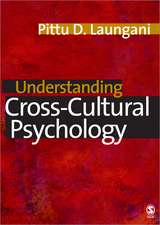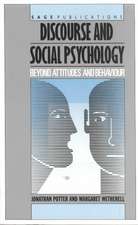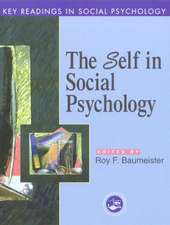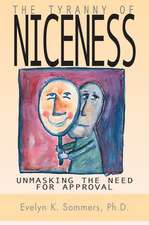Psychology and Postmodernism: Inquiries in Social Construction series
Editat de Steinar Kvaleen Limba Engleză Paperback – 15 oct 1992
Preț: 438.46 lei
Preț vechi: 515.83 lei
-15% Nou
Puncte Express: 658
Preț estimativ în valută:
83.91€ • 86.68$ • 69.83£
83.91€ • 86.68$ • 69.83£
Carte tipărită la comandă
Livrare economică 25 martie-08 aprilie
Preluare comenzi: 021 569.72.76
Specificații
ISBN-13: 9780803986046
ISBN-10: 0803986041
Pagini: 240
Dimensiuni: 138 x 216 x 19 mm
Greutate: 0.3 kg
Ediția:1
Editura: SAGE Publications
Colecția Sage Publications Ltd
Seria Inquiries in Social Construction series
Locul publicării:London, United Kingdom
ISBN-10: 0803986041
Pagini: 240
Dimensiuni: 138 x 216 x 19 mm
Greutate: 0.3 kg
Ediția:1
Editura: SAGE Publications
Colecția Sage Publications Ltd
Seria Inquiries in Social Construction series
Locul publicării:London, United Kingdom
Recenzii
`This far-ranging exploration of the implications of a postmodern culture for psychology represents an international array of perspectives... it examines the relations of postmodernism to feminism, capitalism, methodology, the human sciences, the arts, epistemology, subjectivity, science and psychoanalysis. In doing so, it provides a portrait of psychology at the cutting edge of developments in the arts and humanities. Until recently, these developments had been simply ignored by psychology. Now, they are beginning to be bandied about by the appropriation of poorly understood phrases and ideas. This volume should add real depth to that dialogue' - The Humanistic Psychologist`In this very readable volume, psychologists have gathered around them postmodernists from other disciplines to celebrate (albeit with a couple of dissenting voices) postmodernity' - British Journal of Psychology
Cuprins
Introduction - Steinar Kvale
From the Archaeology of the Psyche to the Architecture of Cultural Landscapes
Toward a Postmodern Psychology - Kenneth J Gergen
Postmodern Psychology - Steinar Kvale
A Contradiction in Terms?
`Getting in Touch' - John Shotter
The Meta-Methodology of a Postmodern Science of Mental Life
Postmodern Subjects - Mike Michael
Towards a Transgressive Social Psychology
Postmodernism and the Human Sciences - Patti Lather
An Introduction to Deconstructionist Psychology - Paul Richer
Postmodernism and Subjectivity - Lars L[/]ovlie
Postmodern Self-Psychology Mirrored in Science and the Arts - Neil Young
Postmodern Epistemology of Practice - Donald E Polkinghorne
The Epic of Disbelief - Louis A Sass
The Postmodernist Turn in Contemporary Psychoanalysis
From Mod Mascu-linity to Post-Mod Macho - Mary Gergen
A Feminist Re-Play
From Theory to Practice and Back Again - Seth Chaiklin
What Does Postmodern Philosophy Contribute to Psychological Science?
`Postmodernism' and `Late Capitalism' - Peter Madsen
On Terms and Realities
From the Archaeology of the Psyche to the Architecture of Cultural Landscapes
Toward a Postmodern Psychology - Kenneth J Gergen
Postmodern Psychology - Steinar Kvale
A Contradiction in Terms?
`Getting in Touch' - John Shotter
The Meta-Methodology of a Postmodern Science of Mental Life
Postmodern Subjects - Mike Michael
Towards a Transgressive Social Psychology
Postmodernism and the Human Sciences - Patti Lather
An Introduction to Deconstructionist Psychology - Paul Richer
Postmodernism and Subjectivity - Lars L[/]ovlie
Postmodern Self-Psychology Mirrored in Science and the Arts - Neil Young
Postmodern Epistemology of Practice - Donald E Polkinghorne
The Epic of Disbelief - Louis A Sass
The Postmodernist Turn in Contemporary Psychoanalysis
From Mod Mascu-linity to Post-Mod Macho - Mary Gergen
A Feminist Re-Play
From Theory to Practice and Back Again - Seth Chaiklin
What Does Postmodern Philosophy Contribute to Psychological Science?
`Postmodernism' and `Late Capitalism' - Peter Madsen
On Terms and Realities
Descriere
This groundbreaking book is the first to explore the implications of postmodernist ideas for psychology. It examines central themes of postmodernism as they relate to psychology - for example, the nature of the self, locally situated rather than universal knowledge and the pivotal role of language in social life.
The contributors outline the new possibilities for psychology, setting theoretical reformulations alongside implications for psychological practice and method. The book presents critique as well as support for postmodern perspectives, from feminist critique of postmodern `deconstruction' to argument with the usefulness of sharp distinctions between a `modern' and `postmodern' psychology.
